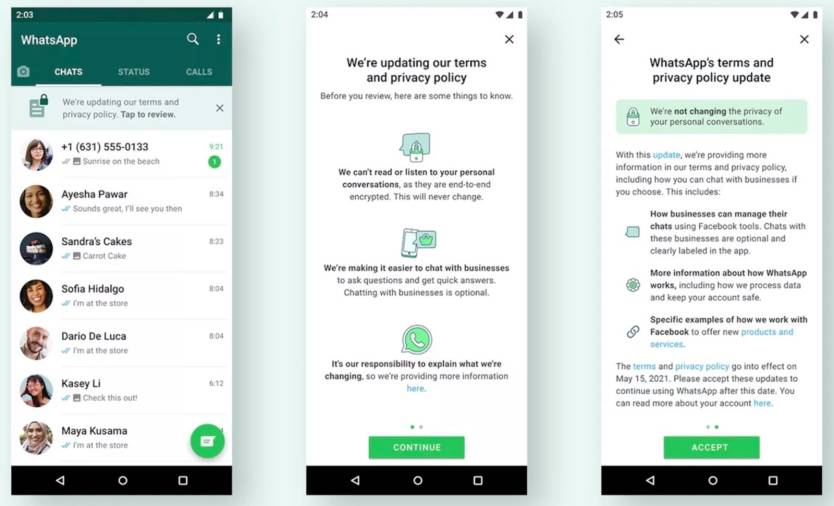Facebook Tries To Explain The WhatsApp Privacy Changes One More Time
- Facebook will place a banner atop WhatsApp to explain the new privacy policy changes coming in mid-May.
- WhatsApp will share some data with Facebook over, and the privacy changes are mandatory. Millions of people downloaded Signal and Telegram in the past few weeks after WhatsApp announced the imminent changes.
- Facebook's new banner will explain that WhatsApp will retain all its end-to-end encryption protections. The new mandatory privacy changes cover the optional chats that people might have with businesses in the future.
It's mid-February, which means a brand new privacy policy should have governed Facebook's WhatsApp instant messaging app by now. All WhatsApp users received prompts to agree to the changes in early 2021, with WhatsApp informing users the changes would go into effect on February 8th. Facebook never gave users the option to opt out of data sharing, and the only way to continue using WhatsApp once was to agree to the data sharing. What followed was an unexpected backlash at Facebook, with millions of users downloading competing apps. Signal and Telegram saw record numbers of new users in the weeks that followed, forcing Facebook to delay the WhatsApp privacy policy change to May 15th.
Facebook said it would give users more time to understand the upcoming changes while clarifying that the WhatsApp end-to-end encryption security features aren't going away. Facebook never explained clearly what data WhatsApp will share with Facebook and why sharing is mandatory. Facebook hasn't given up explaining the new privacy policy, and WhatsApp users will now see a banner on top of their chats that delivers more information about the upcoming change. However, it's not all the information.
Facebook started explaining the changes via a WhatsApp Status update a few weeks ago, insisting that WhatsApp chats and calls are always protected by end-to-end encryption that's enabled by default. Facebook said that some people might be confused about this particular feature.

Facebook will explain the controversial WhatsApp privacy policy change via a banner atop the chat menu.
Facebook is now resorting to the banner seen above to include access to information about the privacy policy changes. Facebook continues to focus on the end-to-end encryption protections that aren't going away from the WhatsApp experience.
But Facebook also says that WhatsApp is also making it easier to chat with businesses — emphasis ours:
We're making it easier to chat with businesses to ask questions and get quick answers. Chatting with businesses is optional.
While chatting with businesses is optional, users can't opt out of the feature. Say you don't plan to use WhatsApp to chat with companies you buy goods from. You won't be able to opt out of sharing data with Facebook. That's mandatory for almost every WhatsApp user.
Facebook explains that businesses pay for the right to use WhatsApp to reach customers, and this is how WhatsApp makes money and remains free. Facebook did pay nearly $20 billion for the app and has never charged customers anything to use the app. But no software can be available for free, and Facebook has to make money off of WhatsApp.
Facebook says in this update that it's "our responsibility to explain what we're changing," but the banner information might not be enough. Facebook is yet to explain why the new privacy policy is mandatory for all WhatsApp users if it only concerns data sharing for those "optional" chats with businesses. Facebook could always require users to accept sharing data only when they start interacting with companies via WhatsApp.
A blog on the WhatsApp site highlights the sort of data sharing that occurs between WhatsApp and Facebook when a business is involved:
Some shopping features involve Facebook so that businesses can manage their inventory across apps. We display more information directly in WhatsApp so people can choose if they want to engage with businesses, or not.
But it's still unclear what sort of personal data WhatsApp would send to Facebook and how/if that data will be used to track users across apps.
Interestingly enough, the privacy changes won't apply to all WhatsApp users, a detail that Facebook might not explain in these banners — here's what a WhatsApp spokesperson said in early January about the change:
There are no changes to WhatsApp's data sharing practices in the European region (including UK) arising from the updated Terms of Service and Privacy Policy. For the avoidance of any doubt, it is still the case that WhatsApp does not share European region WhatsApp user data with Facebook for the purpose of Facebook using this data to improve its products or advertisements.
Facebook also snuck in a hit at competitors in the WhatsApp blog, reminding people who downloaded WhatsApp competitors that not all of those apps are protected by end-to-end encryption.
During this time, we understand some people may check out other apps to see what they have to offer. We've seen some of our competitors try to get away with claiming they can't see people's messages – if an app doesn't offer end-to-end encryption by default that means they can read your messages. Other apps say they're better because they know even less information than WhatsApp. We believe people are looking for apps to be both reliable and safe, even if that requires WhatsApp having some limited data. We strive to be thoughtful on the decisions we make and we'll continue to develop new ways of meeting these responsibilities with less information, not more.
While Facebook doesn't name any names, it must be referring to Telegram. Signal offers the same end-to-end encryption protection as WhatsApp. You'd have to enable end-to-end encryption in Telegram for each independent chat.
